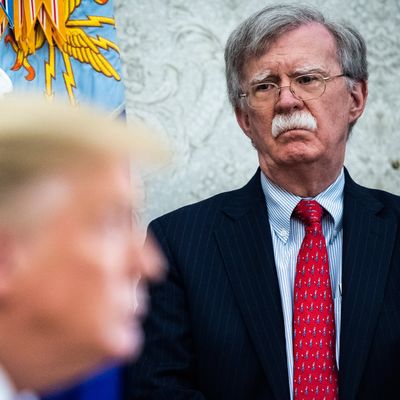
The simplistic, paranoid interpretation of what’s happening with Iran — wherein the U.S. is floating plans for an invasion and hyping intelligence of Iranian attacks — is that ultrahawkish aides are trying to manipulate their toddler president into war. Unfortunately, there is a lot of evidence suggesting this interpretation is correct.
The driving force is national security adviser John Bolton. During the Bush administration, Bolton sought without success to ramp up conflict with Iran. President Trump hired Bolton because he liked his tough-talking Fox News persona, but made him promise when he took the national security adviser job not to start any wars. Trump has repeatedly expressed his concern in private that Bolton is in fact trying to start wars, especially with Iran.
From Bolton’s point of view, the danger is that Trump will negotiate a new nuclear deal with Iran. Trump pulled out of the existing nuclear deal on the general principle that any deal negotiated by Barack Obama is bad and could be made better by renowned deal artist Donald Trump. The president has openly signaled his desire to negotiate with Iran. Trump could cut a slightly tweaked version of the old deal and declare the new, rebranded Iran nuclear agreement to be tough and effective, because Trump negotiated it. The NAFTA playbook, in other words. “We just don’t want them to have nuclear weapons,” he has said. “That’s all we want.”
But that’s definitely not all Bolton wants. The whole point of negating the Iran deal, for Bolton, was to force a confrontation on a wide array of Iranian behavior. His problem with the deal, aside from his hostility to negotiating deals in general, was that it stopped Iran’s nuclear program but let the regime maintain its political and conventional military influence. Bolton wants to broaden the terms of the conflict with Iran, which will inevitably lead to a war Bolton hopes can either cripple the regime or topple it altogether.
We can glimpse a refraction of Bolton manipulating Trump into carrying out his long-standing agenda through the arguments Bolton’s allies are making in public. The Wall Street Journal editorial page and Hugh Hewitt both make Bolton’s case (Hewitt lavishes praise on the NSA director, whose “clarity and intelligence have long cowed his opponents inside the Beltway”).
Their argument runs as follows: First, they remind Trump that the goal of pulling out of the Iran nuclear deal was to prevent Iran from acting aggressively in the region. “Denying Iran the trade and money to finance this adventurism is a major reason Mr. Trump withdrew from the nuclear deal before Mr. Bolton was even in his current White House position,” argues the Journal.
Second, they observe that Iran is now acting aggressively — that is, the scenario they were trying to prevent by pulling out of the Iran nuclear deal is now happening. Oddly, they do not conclude from this that their strategy failed. Instead, they take this as confirmation that they were right about Iran all along.
The Iran deal “recapitalized the IRGC’s expeditionary forces in Syria and its proxy war against Saudi Arabia and the United Arab Emirates, and now has led to attacks on Persian Gulf shipping,” argues Hewitt, neatly skipping straight from Obama’s deal to Iran’s recent response without bothering to note that very large step taken by Trump between these two events. “The real story behind the current Mideast tension,” reasons the Journal, “is that Iran is acting out because Mr. Trump’s policy of applying maximum pressure is working.” Notice the Journal has described the goal of Trump’s policy as denying Iran the money to finance adventurism, but now the existence of this adventurism somehow proves the policy is working. (You might wonder what would indicate failure.)
And third, they argue that Iran is to blame for all this. “If Iran or its proxies react to this pressure by killing Americans, don’t blame Mr. Trump. Blame the state sponsors of terrorism in Iran,” argues the Journal. While Trump “is no fan of long-term ‘nation building’ projects,” notes Hewitt, he “is very much a proponent of hitting bad actors hard when they cross lines.”
So the policy is leading to Iran lashing out with military force. This means, according to its advocates, the policy is succeeding. And when Iran attacks, Trump will have to hit back harder or be mocked as a wimp.
What they are describing is a strategy designed to push Trump away from negotiating and into a situation where military force is his only option. If it looks like Bolton is trying to foment war, it’s probably because he is.






























